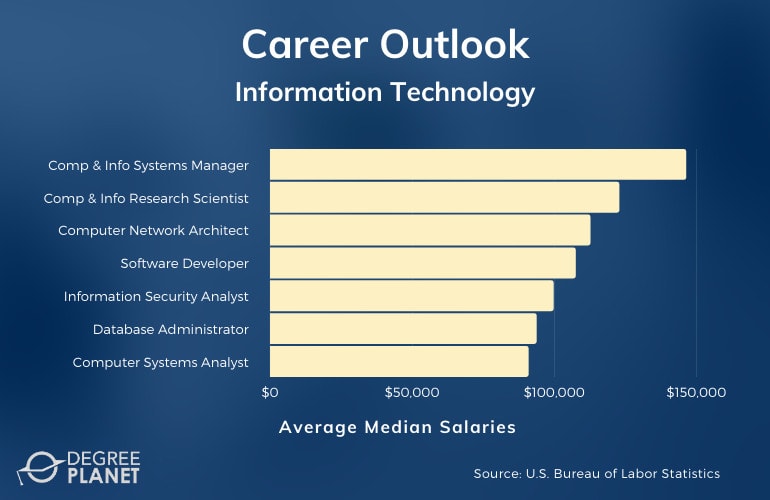Is a master’s degree in information technology worth it? While every student will have a different answer to this question, it’s certainly a degree that can help open doors for you in the IT industry.

Editorial Listing ShortCode:
Since it can be obtained online, it’s also a flexible option for busy people who plan on juggling work, school, family, and other responsibilities.
Is a Masters Degree in Information Technology Worth It?

Yes, a master’s degree in information technology is worth it for many students. According to the Bureau of Labor Statistics, computer and information technology jobs are set to grow at 11% over the next 10 years, faster than the average for all occupations.
Common IT careers in this field include computer scientist, software developer, database administrator, information security analyst, and computer support specialist.
A master’s in information technology can be obtained in several ways. The most straightforward is often a Master of Science in Information Technology, but you can also look into similar degrees like a Master of Science in Internet Systems, or a Master of Science in Information Management.
Information technology can also be specialized in as a concentration area for other degrees. For example, you might pursue a Master of Computer Science or a Master of Applied Data Science with a focus in IT. There are even Master of Business Administration (MBA) programs with IT specialties.
Editorial Listing ShortCode:
As for the subjects that you’ll learn, it depends on what you want to study. Common courses include topics like data analytics, network administration, software development, online information systems, and the management of IT resources.
If you’re specializing, you might be offered subjects like “Introduction to Computer Forensics” or “Cybersecurity Infrastructure.”
If you don’t have a pre-existing background in IT, you’ll likely need to take the fundamentals. You might be considered a “conditional” or “pre-candidacy” master’s student until you meet these requirements.
After you graduate, a master’s in IT can provide a wide range of career options. These may include everything from traditional coding and programming jobs to out-of-the-box jobs such as web development and video game design.
How to Decide Whether a Masters Degree in Information Technology is Right for You

It usually isn’t easy to earn an information technology masters, so before you enroll, make sure that the traditional or online information technology degree program aligns with your particular skills and career goals.
Here are just a few statements that can apply to successful IT students:
1. You’re good with computers.
This might sound like a no-brainer, but some people are attracted to information technology careers for the money or the job security, and they struggle with the more technical side of things.
You’ll likely need to be comfortable with computers to truly excel in IT. You may also need to be comfortable teaching yourself new skills or systems whenever they appear. It’s a fast-moving industry where people are always engineering upgrades, breakthroughs, and software alternatives, so you will likely be continually learning.
2. You want a tech-based career with a human element.

Information technology jobs have a lot in common with computer science and data science jobs, but one of their main differences is the fact that they have a human component as well.
You probably won’t just be stuck in a room and staring at a laptop all day. Depending on your job, you might collaborate with engineers, report things to executives, troubleshoot problems with customers, or supervise new tech installations for company employees.
3. You want a master’s degree to take the next step in your education or career.
As businesses become reliant on digital systems, there’s higher demand for computer and technology specialists, and this leads to more competition for jobs.
A bachelor’s degree has become the minimum for many entry-level IT positions. To stand out, you might need an advanced degree like a master’s or even a doctorate. This is especially true if you have your eye on a managerial career.
5 Things You Can Do with a Masters Degree in Information Technology

There are so many jobs that you can pursue with a traditional or online IT masters degree that a full list would go on for pages and pages. Instead, let’s take a look at five of the most common jobs for high-level IT grads.
1. Computer and Information Systems Managers
Also called information technology managers, this is a career for senior professionals who have the education and experience to act in a supervisory capacity over others.
Editorial Listing ShortCode:
Their job duties might include everything from developing new IT strategies to analyzing the costs, risks and performances of existing programs. It’s one of the highest-paying jobs in the industry where the top earners can take home more than $208,000 per year (Bureau of Labor Statistics). This high salary potential makes this degree or an information systems degree worth it for many students.
2. Information Security Analyst

Security is a booming specialty in the field of IT. As more companies turn to things like cloud computing, they need increasingly sophisticated methods of protecting their data.
The job of an information security analyst is to monitor and manage a company’s networks, databases and digital archives to ensure that their information is never compromised by hacks or just plain old-fashioned errors.
3. Web or Software Developer

These are two distinct jobs with their own skill sets and salary ranges, but since they have similar job duties, it’s okay to lump them together for the purpose of career discussion.
Both web and software development typically require a touch of creativity to go along with tech-based knowledge. You may find work in fun, dynamic fields like marketing and advertising in addition to traditional fields like corporate finance.
If you’re looking to utilize your IT knowledge in a visionary kind of way, web or software development might be a viable option for you.
4. Computer Support Specialist

This is what a lot of people think of when they hear the words information technology. If you have a master’s degree, however, you might be able to move out of the call center and into a corner office.
Senior computer support specialists often have high-paying jobs where they troubleshoot problems for entire departments or companies as opposed to individual customers.
5. Computer and Information Research Scientist

Another information technology career that has the potential to reach six figures, a computer scientist is a highly skilled professional that works with databases, networks, servers, and software programs. They can even have specialties in things like robotics.
If you’re interested in a science or research-based career like this, you might be able to find job opportunities everywhere from tech companies to the federal government.
Master’s Degree in Information Technology Alternatives

If you aren’t entirely sold on a Master of Science in Information Technology, there are a number of alternatives that you can pursue.
- Master’s in Computer Science. This is a broad-ranging degree with specializations that can include everything from cybersecurity to software engineering. You can also specialize in information technology.
- Master’s in Data Analytics. Data analytics is the backbone of many information-centric careers, including information technology.
- Master’s in Business Administration. If you have an interest in business, you might find more applications for a general business degree than a concentrated IT degree.
These are just a few of the options that you might see in college catalogues. There are many more, including master’s degrees in topics like technology, information management, information science, and business intelligence.
Information Technology Careers & Salaries

According to the Bureau of Labor Statistics, the field of computer and information technology has an average salary of $91,250 per year.
Editorial Listing ShortCode:
However, this is a broad look at the field that doesn’t account for IT specialists with advanced degrees, and it doesn’t explore the many different jobs that are available to IT grads:
| Careers | Annual Median Salaries |
| Computer and Information Systems Manager | $151,150 |
| Computer and Information Research Scientist | $126,830 |
| Computer Network Architect | $116,780 |
| Software Developer | $110,140 |
| Information Security Analyst | $103,590 |
| Database Administrator | $98,860 |
| Computer Systems Analyst | $93,730 |
| Computer Programmer | $89,190 |
| Network and Computer Systems Administrator | $84,810 |
| Web Developer | $77,200 |
| Computer Support Specialist | $55,510 |
For the most accurate information technology salary information, look up the full pay ranges of the jobs that you’re considering. There can be quite the difference between the lowest and highest earners in the field.
For example, while the average salary for IT managers is $151,150 per year, their full salary range is $90,430 to $208,000 per year.
Getting Your Masters Degree in Information Technology Online

A master’s in information technology may be the first step to a brighter future in IT. Not only can it help you distinguish yourself in an increasingly competitive field, but thanks to its high earning potential and ever-growing job wheel, it is often one of the most lucrative choices for a person who’s passionate about computers.
Start reaching out to universities and asking about their information technology programs. You don’t have to make any commitments right away. Just inquire about the different options that they have and see what’s out there for IT enthusiasts.

